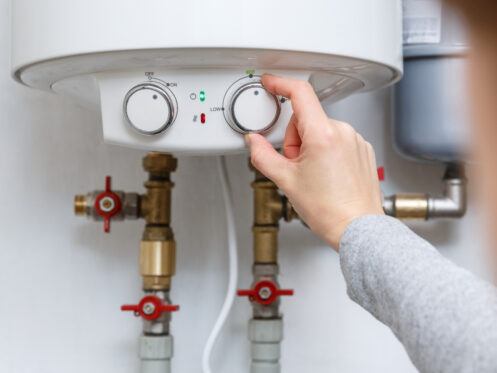Thanks to the proximity to the coastline, when the temperatures drop in South Jersey, you really feel it. That is why it is vital to have a functional heater. You want to keep the home cozy and warm during the winter. However, there is a problem with “too much heat.” That occurs when your heater refuses to turn off. When that happens, the heating situation in the home quickly becomes intolerable.
If you’re having a problem with your heater not turning off, it is crucial to understand why it might be going on. The following are five possible reasons why your heater won’t shut off. These are the conditions you’ll want to discuss with an HVAC technician to come up with an effective repair plan.
1. Busted Thermostat
A malfunctioning thermostat often lies at the heart of an unyielding heater. Start troubleshooting by verifying the thermostat’s temperature settings. Make sure it hasn’t been adjusted excessively. In other words, check with the family to see how often they have changed the thermostat.
Resetting the thermostat to its standard settings should resolve any accidental changes. Additionally, confirming that the thermostat is set to “AUTO” instead of “ON” should ensure proper functioning. That will signal the furnace to operate the blower only when necessary.
If the problem persists after those checks, it could be an indication of a faulty thermostat or a more complex mechanical malfunction. Consider having the thermostat replaced with a smart thermostat. A smart thermostat allows you to monitor and adjust your heating and cooling from an app right on your smartphone. You can make a temperature adjustment from the office, while on vacation, or in the comfort of your bed.
A smart thermostat should only be installed by an experienced, professional HVAC service like Laury Heating Cooling & Plumbing. Your technician should be able to swap out the thermostats in a single visit. Download the app, and it’s ready to operate!
2. Dirty HVAC Air Filter
An obstructed or filthy air filter can wreak havoc on your HVAC system, often leading to a heater relentlessly pumping out hot air. Once you have eliminated the thermostat as a possible cause, you should inspect the air filter for accumulated dirt.
If the filter hasn’t been replaced recently, it might impede air circulation within the furnace. Having an HVAC tech replace the air filter and allow a brief period for the system to stabilize should restore normal heater function.
A dirty filter also contributes to poor air quality in the home. Replacing the filter can help reduce the amount of germs and particulates that circulate throughout the home by way of your heating system.
3. Damaged Blower Fan Motor
If the blower fan motor is malfunctioning, the heater might run continuously until manually shut off. The fan limiter switch is a small part of your heater that plays a significant role in keeping the home at a comfortable temperature. Issues with the fan limiter switch within the motor can disrupt the furnace’s operation, requiring professional repair or replacement.
This is an example of an HVAC complication that requires the expertise of a seasoned professional. Attempting amateur repairs on this critical component can risk voiding manufacturer warranties.
4. Leaky Ducts
Leaking supply ducts can trigger the undesired release of heated air. That hot air often ends up in the attic, where it creates an environment where the thermostat fails to register temperature changes. That, in turn, leads to perpetual heating. A comprehensive inspection of the ductwork can pinpoint the leaks. Those leaks can be professionally sealed using metal tape or other recommended adhesives.
While those ducts are being inspected for leaks, the HVAC techs can also be cleaned of any build-up of dust and dander. That is another task that is best handed off to an HVAC technician.
5. Wrong Size and Wrong Age
An ill-fitting heating system can spell trouble for your home’s comfort. You might have inherited an undersized system when you bought the house. If that system is too small, it will struggle to meet the heating demands, resulting in continuous operation to achieve the desired temperature. That is something that could have been going on since you moved in.
On the other hand, an oversized heater will rapidly heat your home, leading to uneven distribution before shutting off abruptly. This erratic cycle often triggers frequent on-off patterns. Should your heating system refuse to shut down, the issue could mean incorrect sizing.
Seeking guidance from a professional is crucial for an accurate assessment of your house’s dimensions, insulation, local climate, window placement, and occupancy, ensuring an appropriately sized heating solution.
There is also the question of age to consider. The average lifespan of a furnace is between 105 and 230 years. It could be on its last legs if your home was built before 1993 and the furnace was never replaced. Over time, wear and tear diminish its cooling capacity, rendering various components inefficient. Consequently, the aging system demands extended running periods to maintain a comfortable indoor temperature.
If your dated heater shows no signs of stopping, it might be time to consider an upgrade to a more modern and efficient unit. This investment will help add value to your home. More importantly, it will guarantee optimal heating performance for your home.
6. Managing an Overactive Heater During Repairs
After all the troubleshooting and searching for a problem, there could still be a recurring issue with the unit not shutting off. You don’t want to leave it running at high temperatures around the clock. That is when you call in a pro to manage the repair.
While waiting for professional assistance, finding a temporary solution to the persistent heat is crucial. Does your thermostat have an “off” switch? That is a simple solution. If that doesn’t work, go to the circuit breaker box to cut power to the HVAC system altogether.
Look at the actual unit if you don’t want to flip a circuit. Some heating units might feature a designated “ON/OFF” switch for manual control. You can turn off the system manually to wait for the repair team.
7. Ensuring Comfort and Safety in South Jersey
Excessive heat can make living spaces intolerable, posing health and safety hazards. Laury Heating Cooling & Plumbing has been providing a full range of HVAC services since the company was founded in 1945. Those HVAC services include repairing and installing geothermal heat pumps, variable-speed heat pumps, natural gas conversion, ductless systems, and more.
That same level of experience for the heating system is also applied to air conditioning systems for any size home or business. Additionally, Laury Heating Cooling & Plumbing provides a complete line of plumbing services, including repairing and maintaining water heaters, sump pumps, sewer lines, and drains. Our service area extends from Vineland all the way to the shore and surrounding areas. Call Laury Heating Cooling & Plumbing at the first sign of trouble for a fast and reliable repair.



